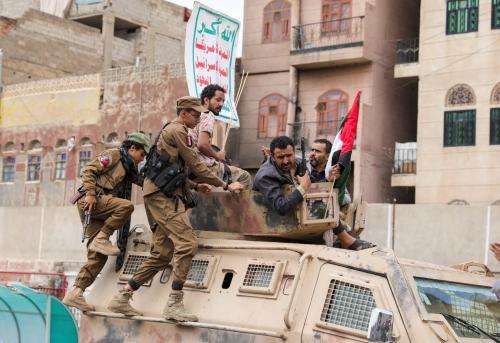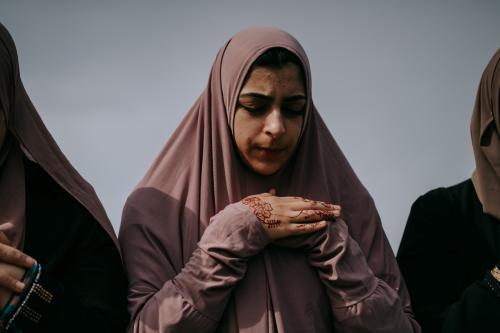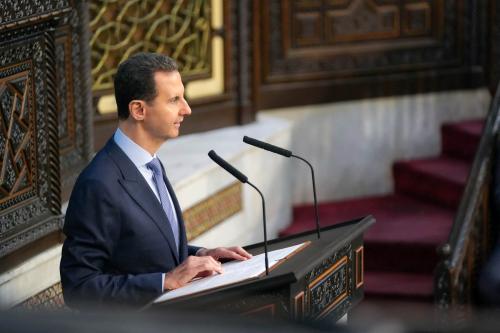Editor’s note: This article was published by Tahrir Squared.
It has been two years since that historic day in Cairo. All too often now, it seems, those 18 days of the original uprising are forgotten, or put aside as romantic & idealistic fantasies. Yet, for those who were in that square for even a part of those 18 days, those days represent something special. One of the most famous martyrs of revolution, the Azhari Sheikh Emad Effat, reflected upon them in this way: ‘the first time I walked into Tahrir Square was the first time I saw Egypt’. For those who committed themselves to the January 25 revolution, those 18 days were truly the first time Egypt in all her beauty was shown to them. It was a time when the spectrum of Egyptians of different classes, genders, religions and political backgrounds cooperated with each other in a spirit of solidarity, bravery and sacrifice. Mubarak did not bring the revolutionaries to the square day after day; it was the promise of the possibility that an Egypt that remained united, that remained as it was in Tahrir, could be.
People have to remember: around 11% of Egyptians participated in the uprising, whether by being Tahrir Square itself, or joining other protests across the country. While an overwhelming majority of Egyptians supported the revolution – for most, the revolution ended on February 11, when Mubarak was forced from office. For revolutionaries, the act of ousting Mubarak was but one small, important step. The more important, potentially transformative step was the broader message of the 18 days: to awaken the civic consciousness of the Egyptian, so as to strive for a future where all Egyptians were respected as they were in Tahrir Square. Two years on, it is clear many who came to the square before are at each other’s throats now. Two years, it is important to remember what the Tahrir Square of those 18 days meant – and continues to mean – in the context of all the political forces that now occupy the arena that exists because of that Square.
In reflecting upon that, one might consider the role of the Muslim Brotherhood (MB) – precisely because that role is become ‘rewritten’ in the annals of revolutionary history. It is true that the story of the 18 days cannot be told if the young men and women of the MB are written out of it; rather, they were a critical element in those days. The young Brothers and Sisters were not, however, the leaders of their movement – not then, and not now. That leadership, clearly, was never interested in this revolution beyond their own partisan interests. That was clear in how it broke with the rest of the revolutionary forces over the military’s constitutional referendum in March 2011; how it came to independent arrangements with that establishment that is part and parcel of the Mubarak-era system that the revolution has sought to change; how it reneged on the commitments it made to supporters of the revolution who backed Mohamed Morsi’s presidential bid against a Mubarak-era holdover in the second round; and the list can continue. That will be forever a stain on the history of the MB’s leadership.
What, then, of the MB beyond its leadership, and their connection to the revolution? Many have already made a choice – and left the MB altogether. Some stay, hoping that the MB leadership will change – and perhaps in the future, they might also depart. It is surprising to many that they have not done so already, particularly after the brutality of the clashes at the presidential palace in December 2012. But they are no less surprising than many other Egyptians who could not believe that the institutions they trusted and believed in for so long, such as the military, could be less than sterling. Sometimes, the awakening may be a rude awakening indeed – and it may take a while. If and when that awakening takes place for anyone, the revolution should welcome them with open arms, because they were some of the most sincere supporters at the hardest of times.
Particularly after the uprising, one must also recall the different Salafi groups and movements. As difficult as it may be for some to consider, they are also a part of this revolution. Many have religious reformation ideas that are problematic for a whole slew of reasons – and arguably alien to the religious history of Egypt as a whole. Indeed, many of them were opposed to the revolution on that doctrinal basis. Others did not – and a core part of this revolution is the ability to intellectually disagree in a spirit of safety and openness. From that standpoint, the Salafi groups as groups, and as individuals, are a test for the revolution – how the revolution relates to them, engages with them, in a nuanced fashion. When any group turns to destroy that possibility of mature discourse, where there is no safe space to argue and dispute, only to be replaced by coercion and force, the revolution has failed. Those that have only joined the revolution out of opportunism to promote a narrow religious agenda will never be committed to the revolution, and will be shown as such. But that should not always have to be the case, nor is it the case now for all Salafis in Egypt.
It is not only the Salafis that are tested by the revolution – the infamous ‘liberal, secular youth’ of the Square are as well. These labels denote less of a deep understanding of liberalism or secularism, and more indicate of political identities. Some, for example, in a betrayal of liberalism, wanted the army to intervene in Egyptian politics in order to keep the Islamists out – others, for the same reason, were willing to support Ahmad Shafiq for the presidency, in spite of the fact that they suspected he’d roll back the revolution. While it is understandable that different political trends will oppose each other, the embracing of ideas that would have made the 18 days impossible cannot be considered revolutionary. Or to put it another way: opposing the Muslim Brotherhood in 2013 does not automatically make you a supporter of the revolution that began in 2011.
What of those who were not in the square in those 18 days – a group that was largely indifferent, or even opposed to those 18 days – but who now seek to join the revolution? The different members of the felool, or ‘remnants’ of the former regime, either supported Mubarak, or did not desert him during the 18 days. This is a group that troubles the revolutionary camp perhaps more than any other, as it contains people who might be allies, latecomers though they may be.
If the revolution accepts those who want to restore the system that destroyed civil society in this country, and provoked the final reaction that exploded in the 18 days, the revolution becomes meaningless. There should be no naïveté in this – there are indeed individuals and groupings that remain that want to do precisely that. They and the revolution may have common opponents – but if they become friends or allies of the revolution, the revolution ends. On the contrary, many have committed crimes in support of the former regime, and they ought to be held to account.
There are others, though. There are those who simply couldn’t bring themselves to believe that Egyptians could actually create a revolution, and preferred to hope for reform or eventual change, which is why they didn’t support those 18 days. They even supported Shafiq in the first round of the presidential election, let alone the second, because they so feared that the revolution was a fraud.
They were wrong – and that needs to be said. To pretend that it was not a mistake is to demean and insult the memories of the martyrs in that square – those who gave their lives so that all Egyptians might have a chance then, and now, to build a new future. Yet, if they are willing to join in the caravan, realize their error, and believe in the promise of those 18 days, no one ought to stand in their way. Indeed: most Egyptians in the square over the 18 days had previously made a mistake. They redeemed their tolerance, acceptance, and participation of Mubarak’s regime by being in the Square.
The key point now is: are they, those who were in the square in the 18 days, and those who want to join the revolution now, willing to work for an Egypt where all Egyptians, Islamists and leftists, liberals and conservatives, can be a part of a pluralistic political sphere? Does the promise of those original 18 days instill hope in their future? Would they be in that Square again, given the chance? If so, then the revolution of the 25th of January is their revolution, and the sacrifices of those who have fallen in it are their fallen. Those young men and women of all backgrounds gave so much to work for an Egypt where a pluralistic political system, and an open civil society, could be created. They forfeited so much so that an Egypt could come into being where all could feel they belong and participate, even while disagreements might continue to be.
Those Egyptians who are able to uphold the right of each other to be a part of such an Egypt, and work to establish such an Egypt are not working for a fantastical utopia. They are struggling for a revolution’s success. That revolution continues. That revolution is #Jan25.



Commentary
Op-edThat Is The Revolution: That Is #Jan25
January 25, 2013